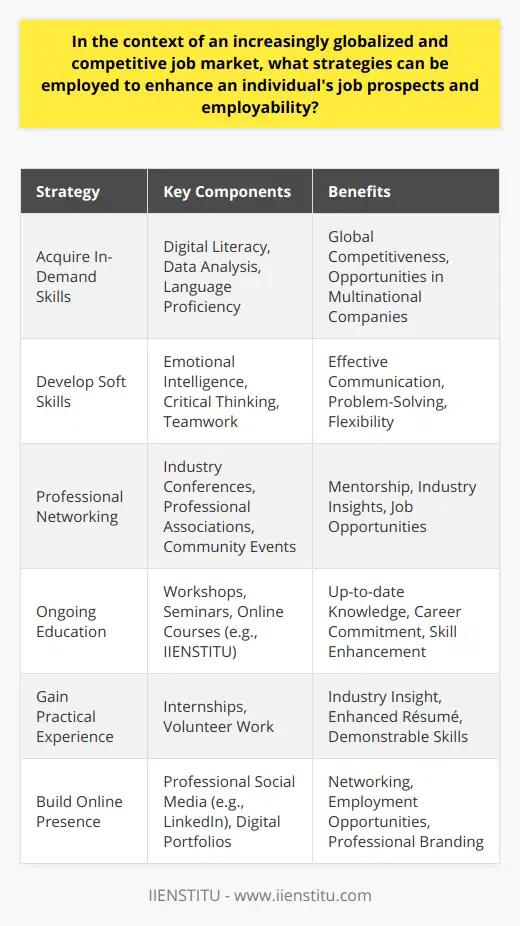
There are many factors to consider when looking for a job. It's not always easy, but you can find the perfect position for you with the right advice and resources. First, we'll offer some advice to those who say they can't find a job in this post. Next, we'll help you assess your skills and identify your ideal career path. Plus, we'll provide tips for networking and creating an effective resume. Follow these steps, and you're sure to find the job of your dreams!
You're not alone. Here are tips to help you find a job for you.
Job hunting can be a lonely and frustrating process. It's easy to feel like you're the only one sending out dozens of applications with no response, but the truth is that many people are in the same boat. The job market is competitive, and it can take time to find the right fit. However, there are some things you can do to improve your chances of landing a job. Start by networking with people in your field, attending industry events, and reaching out to companies that interest you. You can also create a strong online presence by ensuring your LinkedIn profile is up-to-date and engaging with potential employers on social media. If you're persistent and put yourself out there, you'll eventually find a job that's a good match for your skills and experience.
Don't give up - keep looking for jobs, even if it feels like you're doing it all wrong.
The job market is tough, and it can be easy to feel like you're doing it all wrong when you've been looking for a job for months with no results. However, it's essential to keep looking and not give up. There are a few things you can do to increase your chances of finding a job. First, take a close look at your resume and make sure it's up to date and error-free. Then, start networking - reach out to your friends, family, and professional contacts and let them know you're looking for a job. Finally, don't limit yourself to online job postings - explore other options such as temp agencies or staffing firms. By taking these steps and keeping up the search, you'll eventually find the right job for you.
Take classes and learn new skills.
As we all know, learning new skills is essential to success in today's economy. So whether you're looking to make a career change or want to stay ahead of the curve, enrolling in classes and acquiring new knowledge is a great way to achieve your goals. Fortunately, there are now more opportunities than ever to do just that. With the rise of online learning, you can take classes from the comfort of your own home and at your own pace. And with the vast array of courses available, you're sure to find one perfect for you. So what are you waiting for? Get out there and start learning!
1. Why learning new skills is important
It cannot be easy to find a job in today's economy. That's why it's essential to keep learning new skills. By continuously expanding your knowledge base, you make yourself more attractive to potential employers. And, even if you can't find a job right away, you can always use your new skills to make yourself more productive. For example, if you learn how to code, you can build your website or create a blog. Or if you know how to cook, you can save money by cooking at home instead of eating out. No matter what new skill you learn, it can only benefit you in the long run. So don't be afraid to step out of your comfort zone and learn something new.
2. The different types of skills you can learn
With the current state of the economy, it cannot be easy to find a job. Even if you have the necessary qualifications, there is often a lot of competition for each position. As a result, it's essential to have a range of skills that can make you more employable. Here are some of the different types of skills you can learn:
Hard skills: These are the technical skills specific to a particular job or industry. Examples include bookkeeping, computer Programming, and welding.
Soft skills: These are "people skills" that can be useful in any job. Examples include communication, teamwork, and conflict resolution.
Transferable skills: These are skills you can use in different contexts. For example, if you're good at organizing information, you can use this skill whether you're working as a librarian or a salesperson.
Personal development skills: These are skills that can help you improve as a person. Examples include time management, stress management, and goal setting.
Related Course: Time Management Free Online Course
Related Course: Online Stress Management Course
Learning new skills can be challenging, but it's worth the effort. By expanding your skillset, you can make yourself more employable and increase your chances of getting the job you want.
3. How to go about learning new skills
It can be tough to find a job, even if you're qualified. With so many people competing for jobs, employers can afford to be picky. They want candidates who have the perfect combination of skills and experience. That's why it's important to keep learning new skills, even after you've landed a job. Employers value employees who are always learning and expanding their skillsets.
There are a variety of ways to learn new skills. You can take classes at a community college or online. You can also read books or articles on the subject or attend workshops and conferences. If you have the opportunity, shadow someone already an expert in the field. The best way to learn, however, is by doing. So get out there and start practicing! You can develop the skills you need to succeed in today's competitive job market with some effort.
4. The benefits of learning new skills
Employers are looking for employees with a specific set of skills. If you don't have the right skills, you may not be able to get the job you want. That's why it's important to keep learning new skills. It will make you more attractive to potential employers, but it can also help you stay ahead of the curve in your current job. Learning new skills can be challenging and time-consuming, but the rewards are worth the effort. By expanding your knowledge and abilities, you can open up new opportunities and career opportunities.
5. How to stay motivated when learning new skills
It can be challenging to stay motivated when learning new skills, especially if you can't find a job that requires those skills. However, there are a few ways to stay motivated:
It can be helpful to set small goals and celebrate each time you reach one. This can give you a sense of progress and keep you from getting overwhelmed.
Try to find a way to use your new skills in your everyday life. For example, if you're learning a new programming language, see if you can use it to create a simple app or website.
Remember that even if you don't land your dream job right away, your learning skills will still be valuable.
They can help you stand out from other candidates and make you more marketable in the future. So don't give up – keep learning and growing, and eventually, you'll achieve your goals.
6. Tips for applying your new skills in the workforce
There are several things you can do to improve your prospects. First, take a close look at your resume and make sure it's updated and error-free. Next, start networking. Attend industry events, connect with people in your field, and let everyone know you're looking for work. Finally, don't be afraid to get creative. If there's a company, you'd love to work for, reach out directly or find another way to get their attention. You can increase your chances of landing the job you want by taking these steps.
Use online resources to help you find a job, including job boards, social media, and networking groups.
If you're looking for a job, you may feel like searching for a haystack needle. With so many job postings online, it cannot be easy to figure out where to start your search. Luckily, a few online resources can help you find the perfect job. Job boards can be a great place to begin your search, as they can provide you with a list of open positions that match your skills and interests. Social media can also be a useful tool for finding a job. Many companies post their open positions on their social media pages, and you can also use social media to connect with potential employers and networking groups. Finally, don't forget about networking groups. These groups can help you connect with other professionals in your field, learn about open positions, and get your foot in the door with potential employers. Using all of these online resources can increase your chances of finding the perfect job.
Use your network to find job leads and get advice.
It can be tough to find a job, especially if you don't know where to start looking. One great way to find leads is to tap into your network of friends and acquaintances. Let people know that you're on the hunt for a job, and see if anyone has any leads. You can also use your network to get advice about your job search. For example, ask people who have been through the process recently what worked for them, and get tips on making your resume stand out. Building a solid network can take time, but it's worth the effort. When it comes to finding a job, it can be extremely helpful to have a group of supportive people in your corner.
Research the job market to see what types of jobs are in demand
If you're looking for a job, it's essential to research the job market to see what jobs are in demand. This can help you determine what skills you need to learn and what types of jobs you should be applying for. Unfortunately, many people don't take the time to do this research and end up applying for jobs that aren't in demand, making it difficult to find a job. Don't let this happen to you! Instead, spend some time researching the job market to find a job that's a good fit for your skills and experience.
Get your resume in order and make sure it's updated.
If you're looking for a new job, the first step is to make sure your resume is in order. Recruiters can quickly spot a resume that's out of date, and if you're applying for jobs in a competitive field, you can't afford to fall behind. Take the time to update your resume with your current skills and experience, and double-check that all information is accurate. If you can't find a job you're interested in, it may be time to consider changing careers. Don't be afraid to explore different options - with an updated resume; you can start fresh and find a job that's a better fit for you.
Beef up your resume with skills and experience you may have overlooked
The hardest part of the search for many job seekers is not finding open positions but rather crafting a resume that highlights their skills and experience. It can be tempting to only include the most relevant information with so much competition. However, this can work against you, as potential employers may see a lack of diverse experience. To beef up your resume, look for skills and experiences you may have overlooked. For instance, if you're struggling to find a job in your field, consider adding volunteer work or internships to your resume. These can help demonstrate your commitment and passion, even if they're not directly related to the job you're applying for. In addition, don't be afraid to list transferable skills that you've acquired through other experiences. For example, if you've worked in customer service, you can highlight your excellent communication and conflict resolution skills. By thinking outside the box, you can create a resume that will stand out from the crowd and help you land the job you want.
Polish your interviewing skills and learn about the company you're interviewing with
If you're having trouble finding a job, it might be time to look at your interviewing skills. Even if you have the perfect qualifications, nailing the interview is essential to getting the job you want. There are a few things you can do to polish your interviewing skills and make a great impression on potential employers:
Take some time to research the company you're interviewing with. Learn about their history, mission, and values. This will help you identify whether the company is a good fit for you, but it will also give you something to talk about during the interview.
Practice your answers to common interview questions. This will help you feel more confident and prepared when you're in the hot seat.
Pay attention to your body language and make sure you project confidence.
Interviewing can be nerve-wracking, but following these tips can help you land the job of your dreams.
Consider freelance work or starting your own business.
If you can't find a job, freelancing or starting your own business can be a great way to make money. With freelancing, you can often set your hours and rates and choose the projects you want to work on. And if you start your own business, you'll be in control of your destiny. Of course, both are freelancing and starting a business come with their challenges. But if you're willing to put in the work, they can both be very rewarding. So if you're struggling to find employment, consider freelance work or starting your own business. It could be the best decision you ever make.
Get involved in your community.
There are many reasons to get involved in your community. Maybe you're looking for a sense of purpose, or you want to meet new people and make new friends. Maybe you can't find a job, and you're looking for something to do with your time. Whatever the reason, getting involved in your community can be a rewarding experience. There are plenty of ways to get involved, from volunteering at a local nonprofit to joining a community group or attending local events. You can also get involved by simply being an active and engaged member of your community, getting to know your neighbors, and taking an interest in the issues that affect your town or city. Whatever way you choose to get involved, remember that you can make a difference.
Attend career fairs and networking events
Too often, students graduate from college and enter the job market without any idea of what they want to do or where they want to work. As a result, they can spend months (or even years) unsuccessfully sending out resumes and attending job interviews without ever getting a foot in the door. One way to avoid this situation is to attend career fairs and networking events while you are still in school. Here, you can learn about the various types of jobs that are available, and you can start making connections with potential employers. Even if you don't end up getting a job right away, attending these events can give you a better sense of what you're looking for and help you narrow down your options. So if you're struggling to find a job after graduation, check out some career fairs and networking events first.
Stay positive and don't get discouraged - remember that there are plenty of jobs out there waiting for the right person to fill them!
There are plenty of jobs out there waiting for the right person to fill them! So if you're feeling discouraged because you can't find a job, don't be. Instead, stay positive and keep looking. There's bound to be something out there that's perfect for you. And in the meantime, remember that there are plenty of other things you can do to make yourself more attractive to employers. So don't give up – keep searching, and eventually, you'll find the perfect job for you.
Be persistent and don't take no for an answer.
If you're looking for a job, it can be easy to feel discouraged. You might submit dozens of applications and hear nothing back or go on several interviews without getting an offer. But it's important to remember that landing a job is a matter of persistence. If you keep at it, eventually, you will find something.
One way to increase your chances of success is to make sure your applications are tailored to each position. Generic applications are often quickly rejected, so it's worth taking the time to customize each one. In addition, don't be afraid to follow up with potential employers. A polite email or phone call can sometimes differentiate between getting an interview and being ignored.
Ultimately, landing a job is all about perseverance. So if you're looking for work, don't give up—keep trying, and eventually, you'll find the right opportunity.
It is important to stay positive and keep looking for job opportunities. You may have to make some sacrifices, but it is worth it. We can help you with your job search. Have you tried any of these methods?
Are you feeling discouraged because you can't seem to find a job? Don't worry; you're not alone. The good news is that you can do things to improve your chances of finding employment. We've outlined a few tips that should help get you started on your job hunt in this post. If you need more assistance, don't hesitate to reach out to us for help. We want to see you succeed!
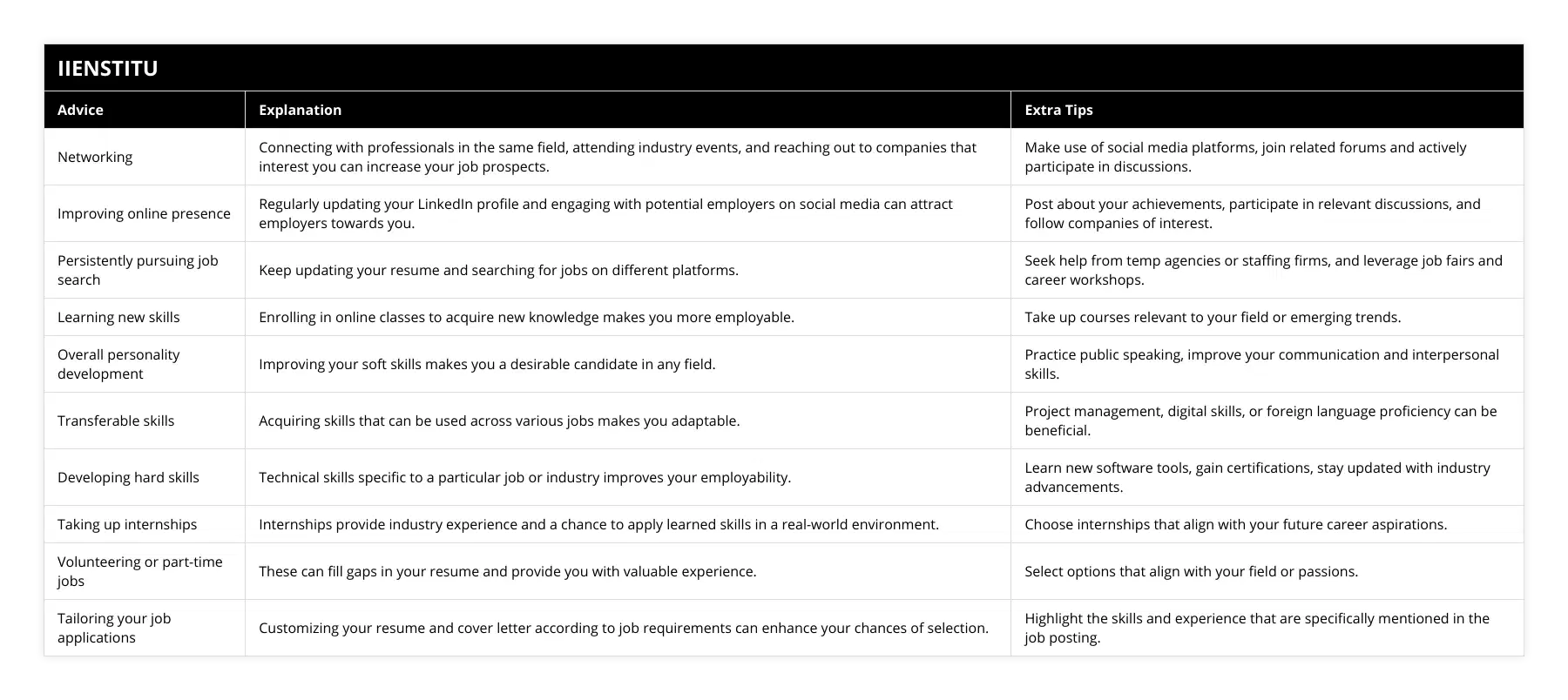
Frequently Asked Questions
What are the most effective strategies for offering support and encouragement to someone struggling to secure employment?
Assessing Individual Needs
The most effective strategies for providing support and encouragement to those struggling to secure employment begin with an assessment of their unique needs, aspirations, and skills. This personalized approach allows one to tailor support to suit the job seeker, making the process more effective in the long run.
Mentoring and Coaching
One powerful strategy to support job seekers includes mentoring and coaching, which facilitates skill-building and instills confidence. Mentors can share insight, guidance, and specific recommendations based on their own experiences, while coaches can help with systematic progress tracking, follow-ups, and accountability.
Networking Opportunities
Facilitating networking opportunities is another key approach, as it helps job seekers to build professional relationships, gain exposure to different job opportunities, and broaden their knowledge about their respective fields. Connecting individuals with networks such as alumni groups, professional associations, and LinkedIn communities can significantly enhance their job search prospects.
Skill Development
Supporting the development of necessary skills is crucial for securing employment. Offering job seekers access to skill-building programs, such as workshops, webinars, and courses, can improve their employability, making them more competitive on the job market. Additionally, research on skills that are in-demand in their respective industries can help guide training efforts to maximize job prospects.
Emotional Support
Do not underestimate the importance of emotional support during the job search process. Encouragement from friends, family, and support groups can go a long way in maintaining a positive mindset and resilience. Regular check-ins with the job seeker, expressing empathy for their struggles, and highlighting their strengths can help boost their motivation to continue working towards their goals.
Feedback and Reinforcement
Lastly, providing constructive feedback on job application materials such as resumes, cover letters, and portfolio samples, and role-playing mock interviews, can significantly sharpen a job seeker's presentation of their abilities to potential employers. Recognition and reinforcement of their achievements in this area can help build confidence and increase the likelihood of employment success.
In conclusion, the most effective strategies for offering support and encouragement to individuals struggling to secure employment involve a combination of mentoring, networking, skill development, emotional support, and constructive feedback. These strategies aim to boost their confidence and employability, ultimately increasing their chances of securing a job in their chosen field.
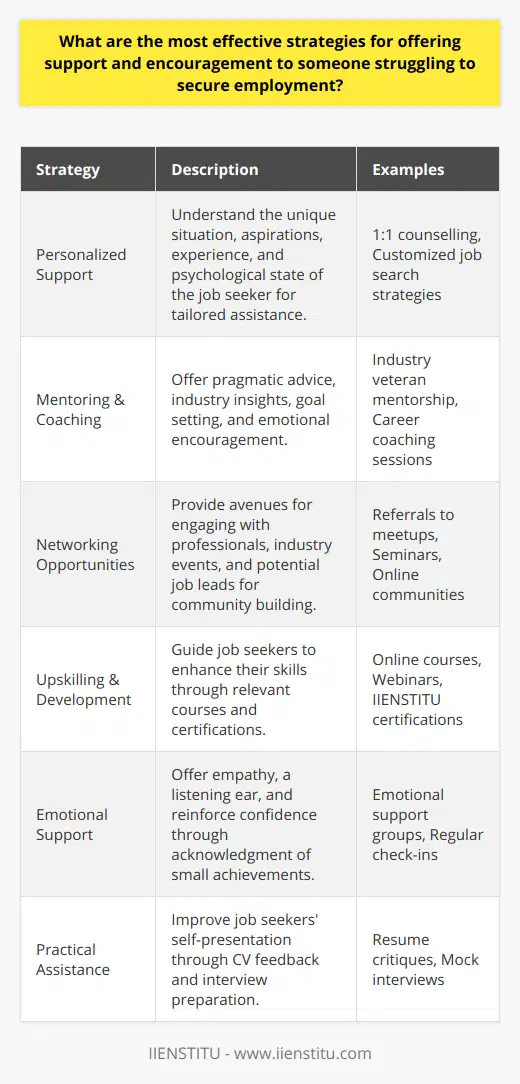
How can one empathetically provide guidance to an individual who has received numerous job rejections?
Understanding the Impact of Rejections
To empathetically provide guidance to an individual who has received numerous job rejections, it is crucial to first understand the emotional and psychological impact of these rejections on the person. Job rejections can lead to feelings of inadequacy, frustration, and even depression. Hence, being empathetic towards the individual's situation is of utmost importance.
Creating a Safe Space for Open Communication
Establishing a safe space for open communication allows the individual to express their feelings and concerns without fear of being judged or criticized. This can be done by actively listening to their concerns, validating their emotions, and providing reassurance that they are not alone in their job search struggles.
Identifying and Addressing Obstacles
Help the individual identify and address any underlying obstacles that may be hindering their job search success, such as gaps in their skill set, weak networking efforts, or a lack of effective job search strategies. This can be done by asking probing questions and offering constructive feedback, facilitating self-reflection and the motivation to pursue self-improvement.
Providing Actionable Advice
Offer practical and actionable advice that the individual can implement, such as improving their resume or cover letter, identifying networking opportunities, or refining their interview skills. This not only demonstrates empathy towards their situation but also helps to empower the individual by providing them with the tools and resources necessary for improving their job search prospects.
Encouraging Persistence and Resilience
Finally, it is crucial to encourage the individual to remain persistent and resilient in their job search, despite facing several rejections. By sharing your own experiences, highlighting inspiring success stories, or offering words of encouragement, you can help the individual foster a resilient mindset that will enable them to ultimately achieve their job search goals.
In conclusion, empathetic guidance involves understanding the emotional impact of job rejections, creating an open and safe space for communication, identifying and addressing obstacles, providing actionable advice, and encouraging persistence and resilience. Adopting these empathetic approaches can significantly help individuals navigate through the challenges of job rejections and support them in achieving their desired career outcomes.
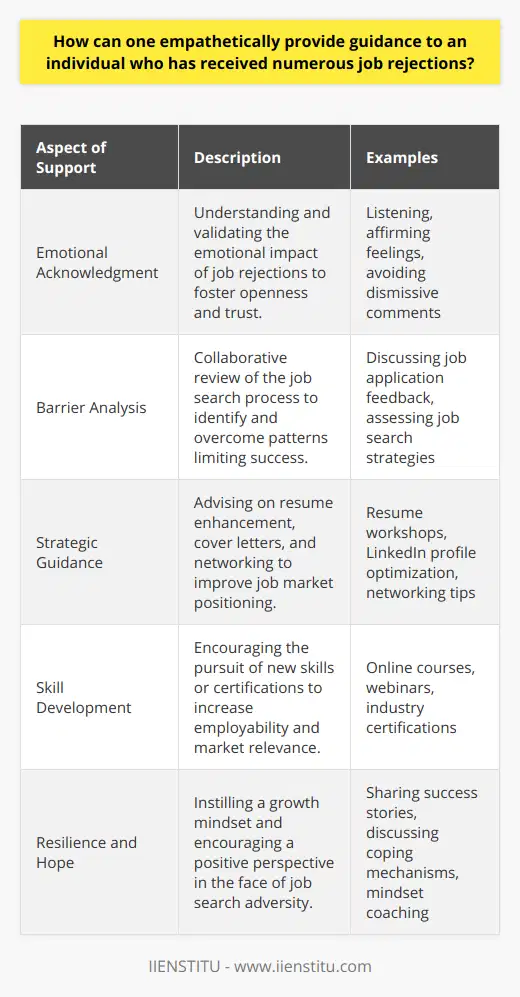
What are key factors to consider in motivating an unemployed person to maintain a positive mindset during their job search?
Factors Impacting Motivation
To effectively motivate an unemployed individual in maintaining a positive mindset during their job search, it is crucial to consider several key factors. These factors can contribute to the individual's internal and external motivation and provide a supportive environment for their job search.
Personal Values and Interests
Firstly, aligning job search efforts with personal values and interests can increase intrinsic motivation. This alignment fosters a sense of purpose and passion, making job seekers more resilient and persistent during their search.
Goal Setting
Setting concrete, achievable goals can serve as milestones in the job search process, allowing the individual to monitor their progress and maintain a positive mindset. Goals should be specific, time-bound, and realistic to encourage a sense of accomplishment and motivation in the job seeker.
Social Support
Having a strong support network, including friends and family, can be essential in providing emotional and practical assistance during the job search. Their encouragement and advice can help job seekers maintain a positive outlook and overcome potential setbacks.
Skill Development
Improving skills and knowledge can make job seekers more competitive in the job market and increase their chances of success. Engaging in continuous learning can foster a sense of achievement and encourage a proactive approach to job hunting.
Self-Care and Stress Management
Maintaining physical and mental well-being is crucial in sustaining a positive mindset during the job search. Engaging in regular exercise, healthy eating, and relaxation techniques can help job seekers manage stress and maintain the energy needed for job searching.
Job Search Strategies
Adopting a strategic and diversified approach to job searching can maximize opportunities and minimize the risk of discouragement. This approach includes utilizing various job search channels, such as online platforms, networking, and professional organizations, to increase the likelihood of finding suitable job opportunities.
Positive Mindset Development
Lastly, cultivating a positive mindset through self-reflection, affirmations, and visualization techniques can contribute to a motivated and focused job search. Overcoming negative thoughts and maintaining optimism can boost self-confidence and drive to succeed.
Acknowledging and addressing these factors can significantly impact an unemployed individual's ability to maintain a positive mindset during their job search. Integrating these elements into job search strategies can provide meaningful and lasting motivation, ultimately increasing the likelihood of achieving employment success.
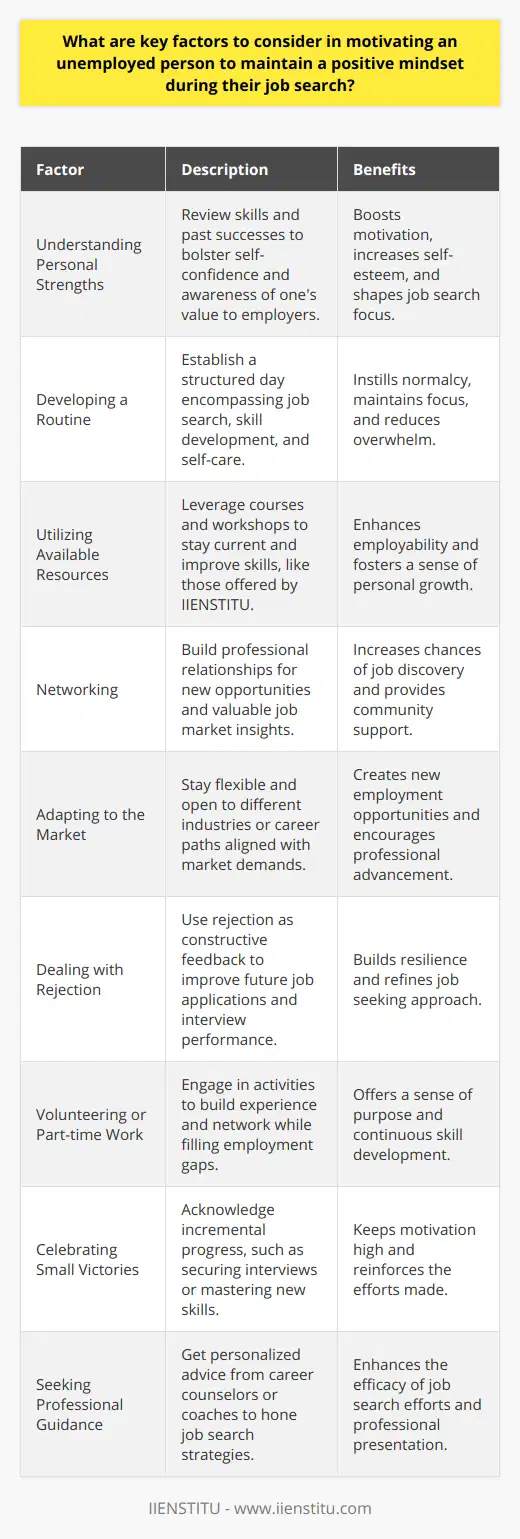
What are the best methods for addressing the psychological challenges faced by individuals unable to secure work?
Support Systems and Skills Development
To address the psychological challenges faced by individuals unable to secure work, it is crucial to implement a combination of support systems and skills development initiatives. Support systems, such as career counseling and extended job search assistance, can help unemployed individuals navigate the job market and address their mental health needs throughout the job search process.
Mindfulness and Mental Health Interventions
Incorporating mindfulness and mental health interventions, such as cognitive behavioral therapy (CBT) or stress management techniques, can reduce anxiety and depression caused by unemployment. These interventions can be tailored to individuals' specific needs while empowering them to manage their emotional well-being.
Building Resilience and Coping Skills
Simultaneously, fostering resilience and coping skills in individuals can help them withstand the pressures and stress associated with being unemployed. Techniques such as positive reframing, goal-setting, and establishing social connections can bolster personal resilience, providing a foundation for emotional stability despite external challenges.
Career Transition Assistance
Career transition assistance programs, which focus on providing relevant skills training and professional development services, can aid individuals in adapting to new industries and job opportunities. Moreover, building a strong support network of mentors, peers, and career coaches can facilitate successful career transitions.
Financial Management Education
Lastly, financial management education can help allay financial concerns that may exacerbate psychological distress. By offering guidance on budgeting, saving, and debt management, individuals can develop financial confidence and stability, enabling them to focus on their job search without the added burden of financial anxiety.
In conclusion, addressing the psychological challenges faced by individuals unable to secure work requires a multifaceted approach that includes support systems, mindfulness interventions, resilience building, career transition assistance, and financial management education. By implementing these strategies, individuals can regain a sense of control over their lives and foster emotional stability as they navigate the job market.
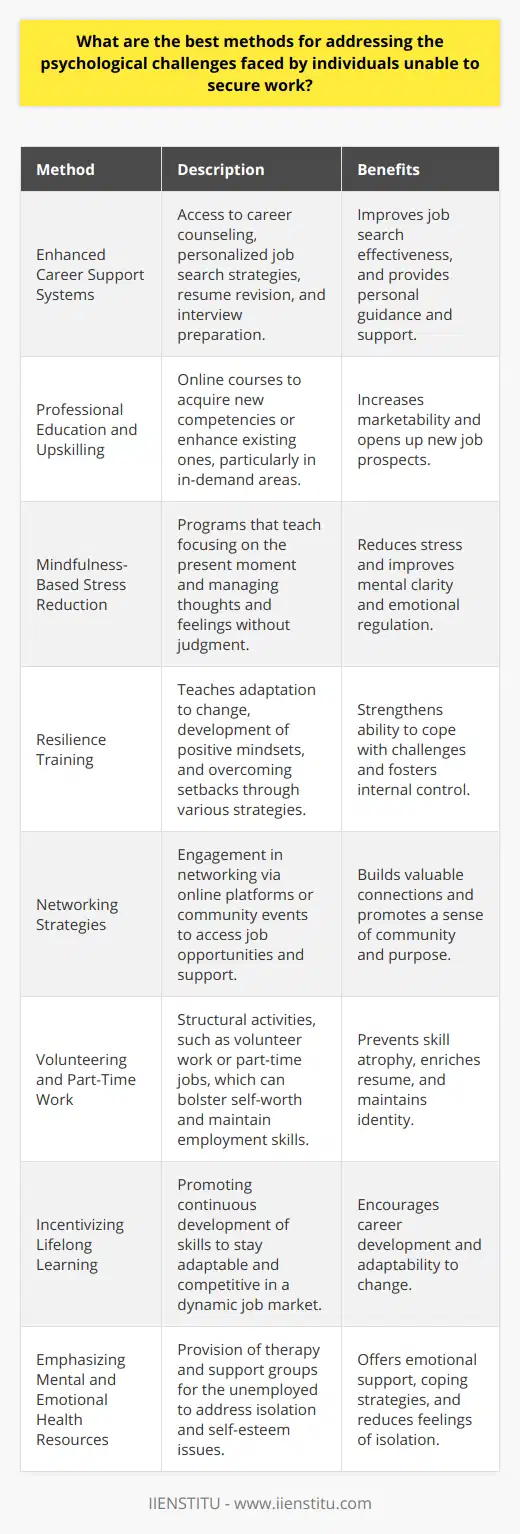
How can we promote a growth mindset in a person experiencing unemployment-related stress?
Developing Empathy and Support
To promote a growth mindset in someone experiencing unemployment-related stress, it is important to first provide empathy and support. Acknowledging their emotions and challenges can create a safe space for them to cultivate resilience.
Skill-Building and Empowerment
Next, we can empower the individual by offering resources and guidance for skill-building and personal development. This can involve encouraging them to explore new interests, participate in online courses or workshops, and to remain open to new opportunities that align with their values.
Goal Setting and Action Plans
An effective way to foster a growth mindset is through the process of goal setting and creating action plans. Setting realistic, achievable objectives that are aligned with their personal and professional interests can inspire a sense of purpose, direction, and motivation.
Enhance Networking and Connections
Encouraging job seekers to continuously expand their personal and professional networks can aid in boosting confidence and opening up new opportunities. Developing relationships with individuals in their fields of interest can provide valuable resources, knowledge, and potential leads.
Embrace the Journey
Lastly, it is crucial to emphasize the importance of embracing the journey and focusing on progress rather than perfection. Reminding the person that setbacks and challenges are inevitable, but valuable learning experiences can support a growth mindset and resilience during unemployment.
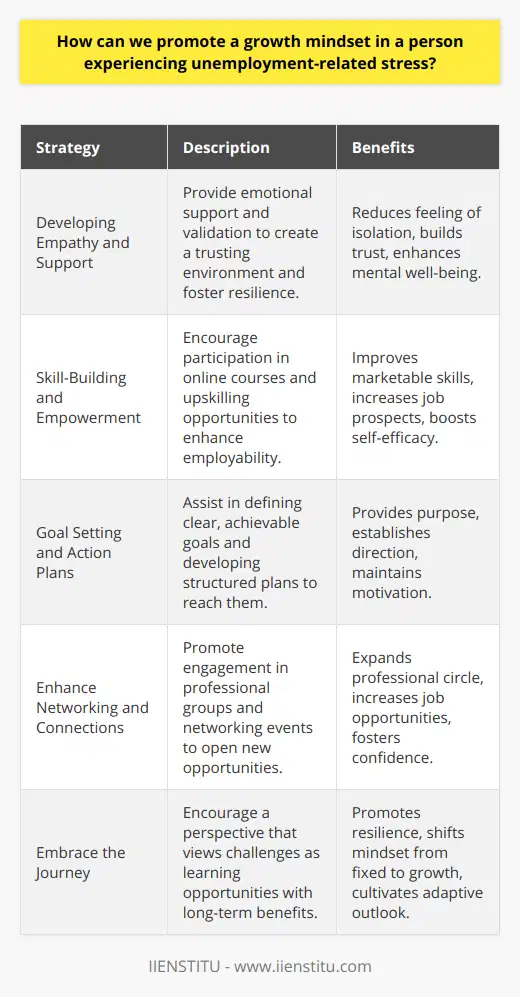
What crucial elements should be incorporated in guidance sessions to help individuals cope with the emotional repercussions of a prolonged job search?
Emotional Support Strategies
To effectively assuage the emotional repercussions experienced by individuals during a prolonged job search, guidance sessions should incorporate several crucial elements. Firstly, empathetic listening should be employed to foster a supportive environment where individuals feel comfortable sharing their experiences, concerns, and feelings.
Creating a Positive Outlook
Secondly, guidance sessions should focus on cultivating a positive outlook and combating negative thoughts. This can be achieved through the promotion of self-awareness, wherein individuals are encouraged to identify and challenge their cognitive distortions, as well as through the formulation of realistic goals and action steps.
Encouraging Social Connection
Thirdly, as social support can significantly alleviate the emotional strain, sessions should encourage individuals to expand their social networks and engage in activities that foster emotional well-being. This may involve facilitating peer support groups or suggesting relevant community programs to establish connections with others facing similar adversities.
Establishing Emotional Resilience
Next, guidance sessions should work towards building emotional resilience in individuals. This can be accomplished by teaching stress management and coping techniques, such as mindfulness or meditation, which promote emotional regulation and have been shown to reduce feelings of anxiety and depression.
Affirming Self-Worth
Lastly, sessions should recognize and affirm the self-worth of individuals, reminding them that their value is not determined solely by their employment status. This can be achieved by highlighting their strengths, past accomplishments, and future potential in order to bolster self-esteem and maintain motivation during the job search process.
In conclusion, through the incorporation of empathetic listening, positive outlook cultivation, social connection encouragement, emotional resilience building, and self-worth affirmation, guidance sessions can effectively address and alleviate the emotional repercussions faced by individuals during a prolonged job search. This multi-faceted approach ensures that individuals are not only better equipped to cope with their current emotional distress but are also prepared to confront future challenges with resilience and determination.
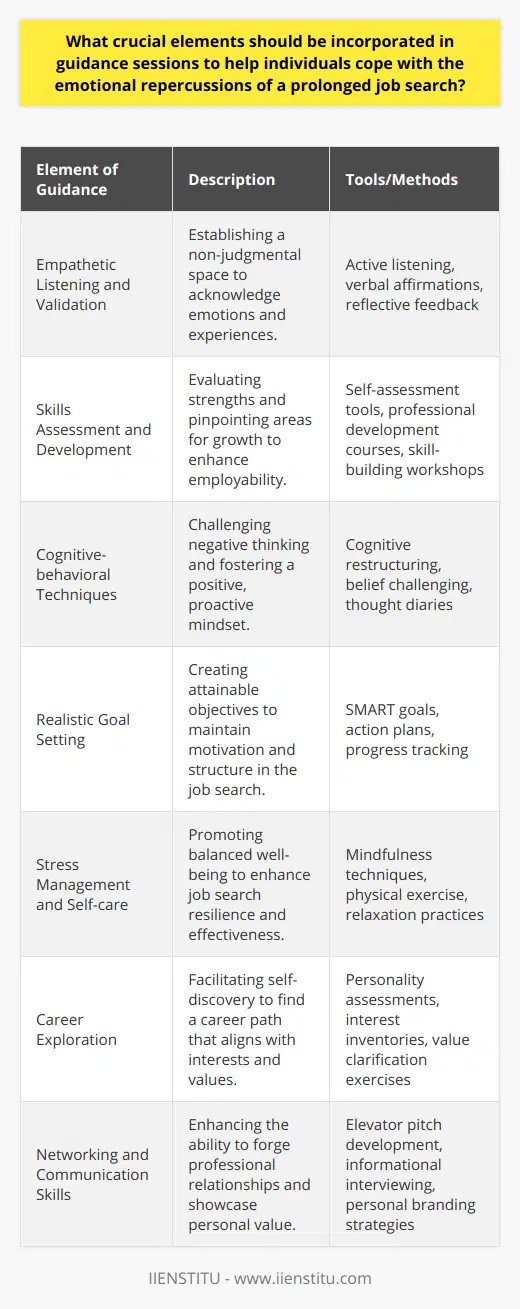
Why is it so difficult to find a job even with a degree?
Educational Mismatch
One reason why finding a job even with a degree is difficult is the educational mismatch between the job market and graduates. University curriculums may not effectively prepare graduates with the specific skills demanded in the current job market. Consequently, employers may find that recent graduates lack the practical experience or specialized knowledge necessary for certain positions.
Changing Nature of Work
The changing nature of work also presents challenges for degree holders. As technological advancements lead to automation and the creation of new industries, job seekers must adapt and cultivate a new set of skills. Moreover, the increasing prevalence of the gig economy and remote work shifts the job landscape, potentially rendering some degrees less relevant and hampering the job search process for graduates.
Economic Conditions
Economic conditions also play a significant role in job availability. In times of economic downturn or recession, companies may reduce hiring or implement hiring freezes. This creates higher competition for available jobs, making it difficult for degree holders, especially recent graduates, to secure employment within their fields.
High Expectations
Degree holders may also have high expectations for their first job after graduation, such as a desirable salary, ample benefits, and promising career growth opportunities. However, these expectations may not align with the realities of the job market or the entry-level positions available. As a result, recent graduates might struggle to find jobs that match their perceived worth, leading them to feel that their degree has not provided the benefits they anticipated.
Networking Importance
Lastly, networking plays a crucial part in job searches. Degree holders who lack a strong professional network, either amongst fellow alumni or within the industry, may miss out on potential job opportunities. In a competitive job market, connections often play a significant role in securing employment, with many positions never being advertised to the public. Therefore, degree holders must actively network to increase their chances of finding a job aligned with their education and career aspirations.
In conclusion, the difficulty of finding a job with a degree can be attributed to several factors, such as educational mismatch, the changing nature of work, economic conditions, high expectations, and a lack of networking. To improve their chances of securing employment, degree holders should adapt to the shifting job market and cultivate a robust professional network.
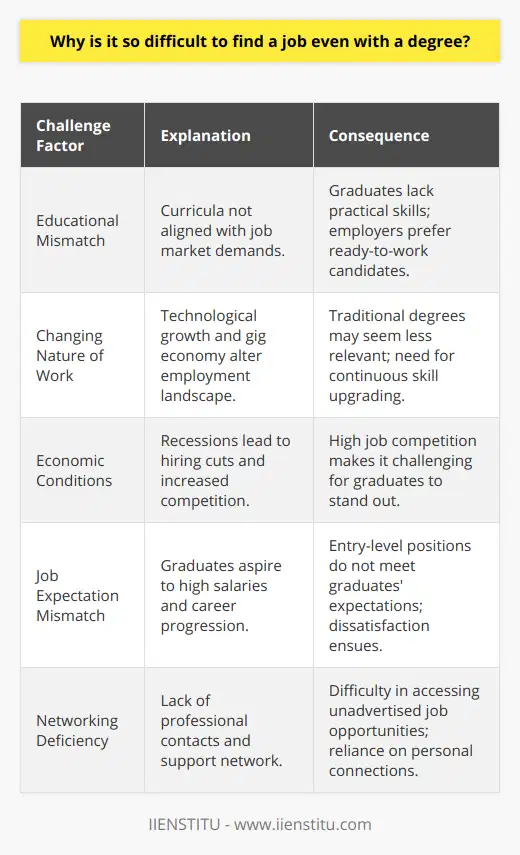
How can one effectively communicate motivation and support to someone who is grappling with long-term unemployment?
Understanding the Emotional Struggles
To effectively communicate motivation and support to someone grappling with long-term unemployment, it is essential to first understand the emotional struggles and challenges they face. Unemployment often leads to feelings of anxiety, depression, and low self-esteem, which can be detrimental to one's mental health.
Empathy and Active Listening
Next, approach the individual with empathy and an open mind, expressing your understanding and willingness to hear their concerns. Actively listening and acknowledging their struggles demonstrates your genuine interest in their well-being.
Tailored Encouragement and Guidance
In order to provide encouragement, it is crucial to understand the person's specific needs and aspirations, as well as their individual strengths and weaknesses. This knowledge will allow you to offer tailored guidance and support, based on their unique circumstances.
Utilizing Resources and Networks
Furthermore, one can recommend the utilization of various resources, such as career centers, online tools, and support groups, designed to assist individuals in their job search journey. Encouraging the unemployed person to tap into their personal networks can also uncover potential opportunities.
Fostering Resilience and Perseverance
During the communication process, emphasize the importance of resilience and perseverance. Remind the individual that setbacks are common, particularly in the current economic climate, and that overcoming them is essential in their quest for employment.
Goal-setting and Accountability
Encourage the establishment of realistic goals, both short-term and long-term, to facilitate progress in their job search. Regularly following up on these goals and offering guidance as needed can provide a sense of structure and accountability.
Reinforcing Self-Confidence
Lastly, one should focus on reinforcing the individual's self-confidence. Remind them of their unique talents, skills, and attributes, and help them identify potential areas for improvement in their professional development.
In conclusion, effectively communicating motivation and support to someone grappling with long-term unemployment requires empathy, active listening, understanding of the individual's specific struggles, and the tailoring of encouragement and guidance. By offering resources, fostering resilience, reinforcing self-confidence, and promoting goal-setting and accountability, one can provide much-needed support during this challenging time.
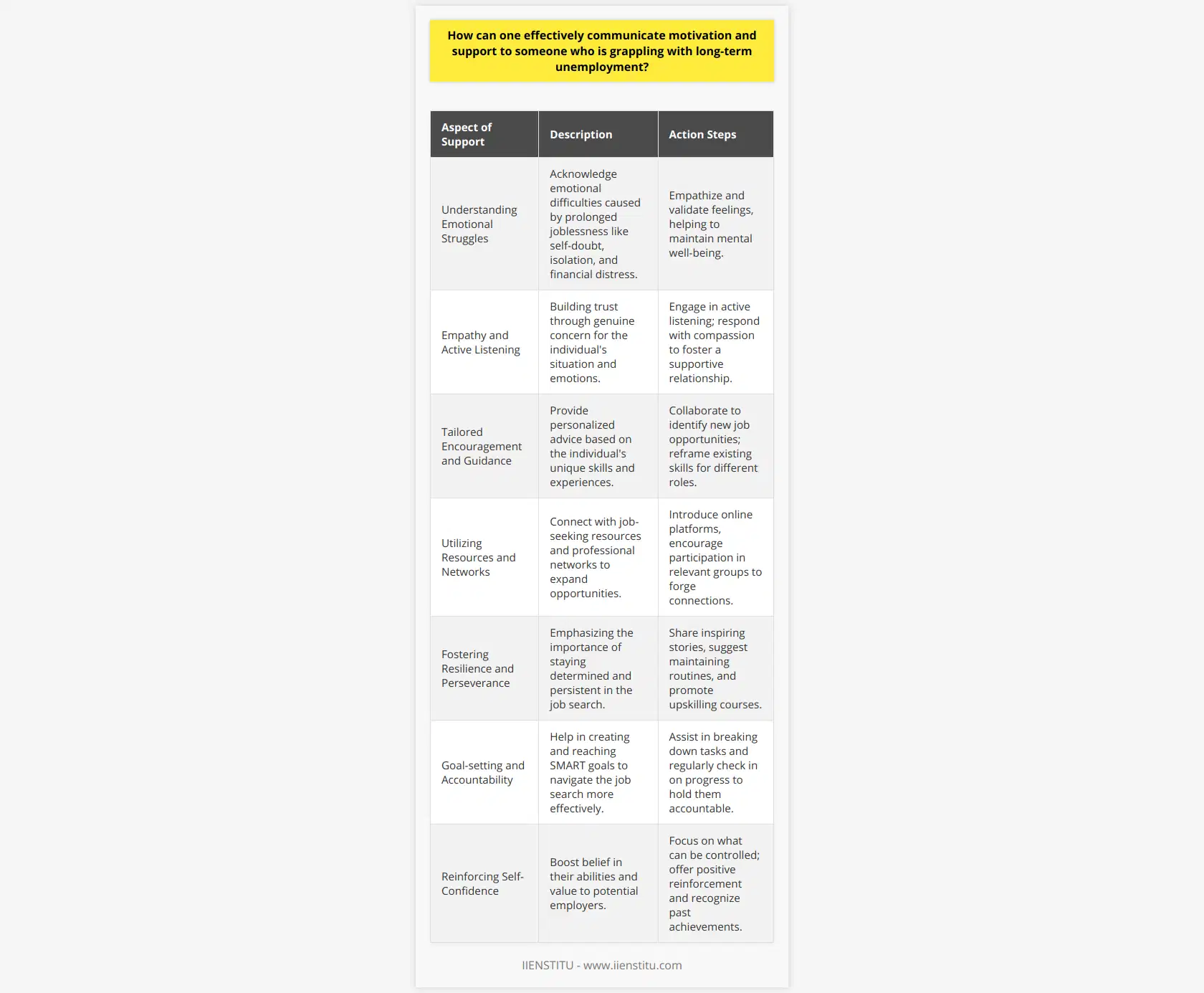
What are the primary approaches for helping someone build resilience and enhance job-seeking skills during a challenging job market?
Developing Personal Resilience
The first primary approach to helping someone build resilience in a challenging job market involves fostering adaptability and developing personal resilience. This entails cultivating positive communication and problem-solving strategies, as well as enhancing emotional regulation and stress management skills (Masten, 2014). By empowering individuals to navigate adversity and adapt to changing environments, they are better equipped to thrive in their professional lives.
Utilizing Career Development Interventions
Career development interventions, such as career counseling or training programs, can also play a vital role in strengthening job-seeking skills. These interventions often focus on building core competencies, such as networking, resume-writing, and interview preparation (Santisi et al., 2018). By enhancing these skills, individuals increase their chances of successfully securing employment during challenging job markets.
Mentorship and Support Networks
Another key factor in building resilience and enhancing job-seeking skills is mentorship and the creation of professional support networks (Luthar et al., 2000). Experienced mentors can provide invaluable guidance, while peer networks enable individuals to share experiences, resources, and advice. This social capital has been shown to improve career outcomes (McDonald et al., 2013).
Harnessing Technological Resources
Leveraging technology is a crucial part of modern job-seeking, given the increasing digitization of the hiring process. By becoming proficient in using job search websites, social media, and productivity tools, individuals can better identify and secure employment opportunities (Carter et al., 2015). Furthermore, these technological resources provide access to remote and flexible work options, expanding the pool of potential job options.
Continuous Learning and Skills Development
Lastly, investing in lifelong learning and continuous skills development not only improves job-seeking abilities but also fosters resilience (Wolff & Lundberg, 2012). By actively seeking out training opportunities, participating in professional development courses, and staying informed about industry trends and demands, individuals continuously adapt their skillset and remain competitive in the job market.
In conclusion, building resilience and enhancing job-seeking skills during challenging job markets require a multi-faceted approach. This involves developing personal resilience, utilizing career development interventions, establishing mentorship and support networks, harnessing technological resources, and committing to continuous learning and skills development. By adopting these strategies, individuals are better positioned to cope with uncertainty and secure employment opportunities.
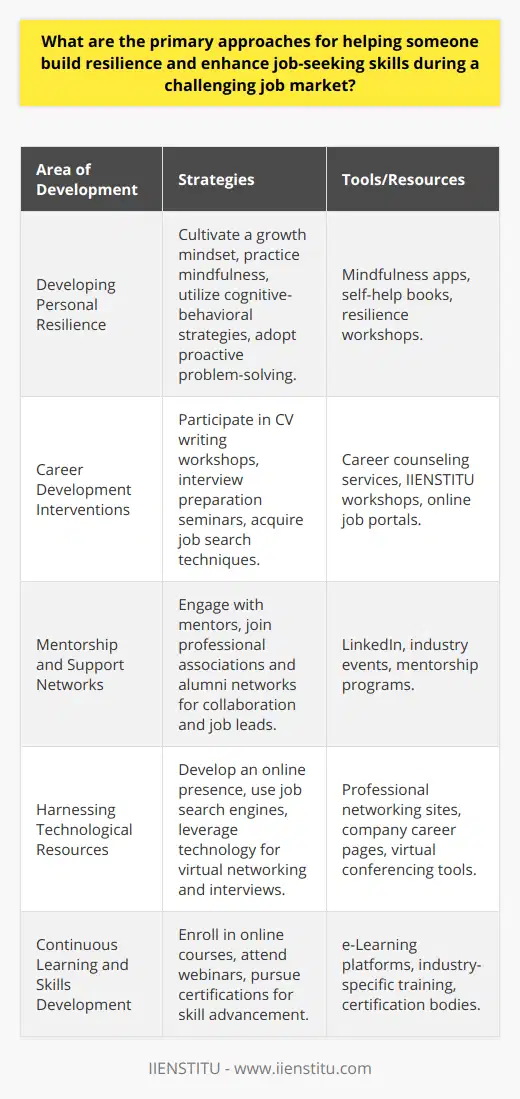
What are the most crucial psychological interventions to employ when assisting someone experiencing difficulties in finding a job?
Interventions to Enhance Job-Seeking Success
When assisting someone experiencing difficulties in finding a job, it is crucial to employ psychological interventions designed to improve motivation, cope with stress, and overcome barriers. Several evidence-based approaches can address these crucial aspects and contribute to job-seeking effectiveness.
Boosting Motivation and Confidence
The first essential component of effective psychological interventions is enhancing motivation and building confidence. This can be achieved through the use of goal-setting techniques and fostering task engagement. Specific, measurable, achievable, relevant, and time-bound (SMART) goals can empower individuals to focus their efforts on attainable outcomes while maintaining motivation throughout the job-seeking process. Additionally, highlighting past successes and positive experiences can foster self-confidence and inspire individuals to pursue their job-seeking endeavors with renewed energy.
Developing Coping Strategies
Next, facilitating the development of coping strategies may help those struggling with job-seeking stress to better manage their emotions and maintain a positive mindset. Cognitive-behavioral therapy (CBT) and mindfulness-based interventions have been shown to be effective in increasing resilience and reducing negative emotional reactions during challenging times. By helping individuals identify and restructure maladaptive thought patterns, CBT promotes more adaptive coping strategies for overcoming job-seeking obstacles. Meanwhile, mindfulness techniques, such as meditation and controlled breathing exercises, can promote self-awareness and emotional regulation, contributing to a more centered and balanced mindset in the face of difficulties.
Addressing Perceived Barriers
Lastly, it is vital to assist job-seekers in overcoming specific barriers that may be impeding their success in securing employment. This can involve providing personalized guidance on communication, interviewing, or networking skills or helping individuals develop tailored action plans to address these areas of development directly. Furthermore, it is essential to assist job-seekers in addressing any internal psychological barriers, such as feelings of unworthiness or self-defeating beliefs that may be hindering their success. Psychoeducation, motivational interviewing, and self-affirmation techniques can contribute to increased self-awareness and increased determination in overcoming barriers and achieving employment goals.
In conclusion, a combination of interventions aimed at enhancing motivation, coping with stress, and overcoming barriers is crucial to ensure job-seeking effectiveness. Employing goal-setting techniques, cognitive-behavioral therapy, mindfulness practices, skill development, and addressing psychological barriers together will contribute to job seekers overcoming the challenges they face and increasing the likelihood of successful employment outcomes.
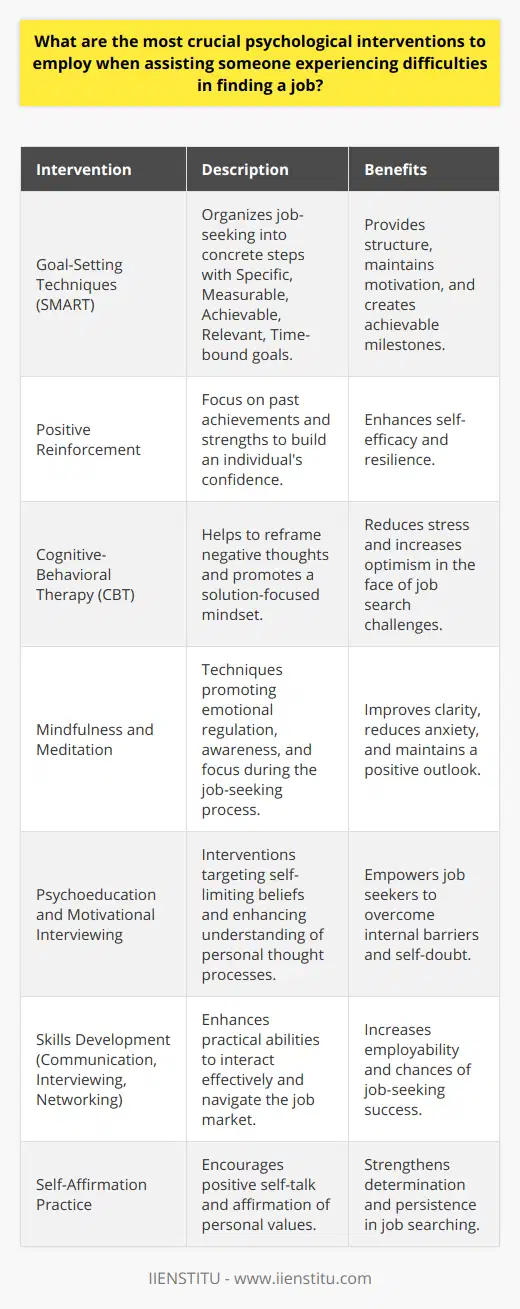
How can one foster a sense of self-efficacy and adaptability in someone struggling with job loss and an uncertain employment future?
Enhancing Self-Efficacy
To foster a sense of self-efficacy in someone experiencing job loss and uncertain employment prospects, it is crucial to help the individual recognize their capabilities and contributions. This could involve assisting them in identifying their core strengths and unique abilities that will enhance their employability. Encouraging the development of new skills or the expansion of existing ones can not only increase self-confidence but also make the affected individual more marketable to potential employers.
Creating Supportive Networks
Developing a strong social support system is essential for maintaining self-esteem and adaptability in times of uncertainty. By connecting with others experiencing similar difficulties, individuals can share resources, advice, and camaraderie. Offering support in finding networking opportunities enables the affected person to build connections with potential employers and learn about new job openings. Career counselors and support groups are valuable resources for individuals in need of assistance in navigating the job-seeking process.
Reframing Mindset and Setting Goals
Reinforcing a positive mindset helps individuals be more adaptable in the face of changing circumstances. Encourage the affected person to view job loss as an opportunity to reevaluate their career path, consider new industries, and potentially achieve a better work-life balance. Helping them to set achievable, incremental goals can create a sense of progress and accomplishment, leading to increased motivation and self-efficacy.
Developing Resilience and Emotional Intelligence
Resilience is the ability to adapt and bounce back from setbacks, and it is strongly linked to self-efficacy. Developing resilience involves learning effective coping strategies for managing stress and fear, as well as maintaining a sense of hope and optimism. Encouraging individuals to engage in self-care practices such as regular exercise, adequate sleep, and cultivating a balanced lifestyle can promote resilience. Furthermore, nurturing emotional intelligence, which enables one to recognize, understand, and manage emotions, can foster adaptability and overall well-being.
In conclusion, fostering a sense of self-efficacy and adaptability in someone struggling with job loss and an uncertain employment future requires a multifaceted approach. By supporting the development of new skills, improving social networks, promoting a positive mindset, and cultivating resilience and emotional intelligence, individuals will be better equipped to overcome their challenges and regain control over their lives.
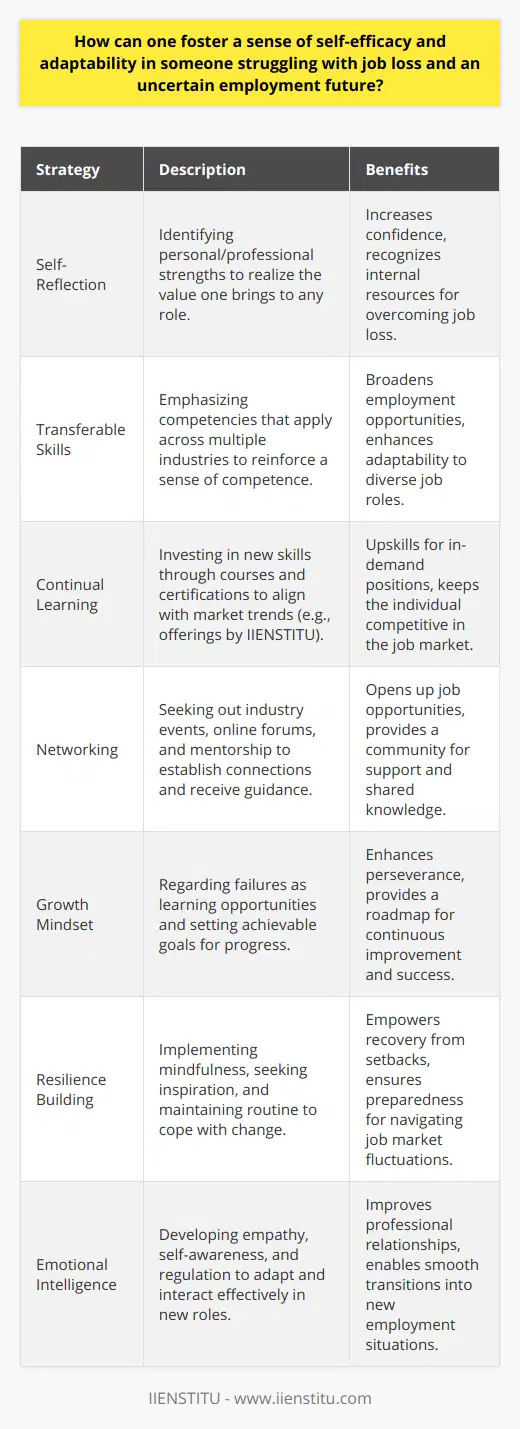
What are the best practices for guiding individuals in managing the complex emotions associated with unemployment and job-seeking?
**Understanding Emotional Reactions**
The best practices for guiding individuals in managing the complex emotions associated with unemployment and job-seeking start with understanding the emotional reactions that might arise during this period. Recognizing feelings of sadness, anxiety, frustration, and anger as normal and expected responses to unemployment is essential for establishing empathy and providing effective support.
**Coping Strategies**
Next, it is crucial to suggest adaptable coping strategies that are tailored to the individual's needs and preferences. Examples include developing routines, engaging in hobbies, staying active through physical exercise, and maintaining social support networks to combat feelings of isolation or loneliness. Encouraging individuals to explore different coping mechanisms increases their autonomy and resilience as they navigate the job-seeking process.
**Emotional Expression and Validation**
As the emotions experienced during unemployment may be intense and overwhelming, encouraging individuals to express and validate their feelings is vital. By creating an environment where people can safely share their emotions, individuals can gain a sense of control over their emotional and mental wellbeing. Validating these emotions also serves to reassure them that their feelings are valid, understood, and supported.
**Setting Realistic Expectations**
It is important to help individuals set realistic expectations about the job-seeking process. This includes informing them about the average duration of job searches, acknowledging the possibility of rejections, and explaining the importance of adaptability in today's job market. Developing a sense of patience and persistence in the face of potential setbacks can minimize feelings of disappointment and despair.
**Upskilling and Self-Improvement**
Encouraging individuals to take advantage of the opportunity for upskilling and self-improvement can positively impact their emotional wellbeing. Developing new skills or strengthening existing ones helps individuals feel more empowered and increases their chances of success in finding suitable employment. Furthermore, personal growth can provide a sense of purpose and accomplishment during challenging times.
**Professional Support**
Finally, recommending professional support services, such as career counseling or mental health counseling, can provide valuable resources and specialized guidance to individuals experiencing emotional challenges during their job search. Making these support services accessible and visible helps normalize the idea of seeking help when needed, reducing the stigma around unemployment and mental health.
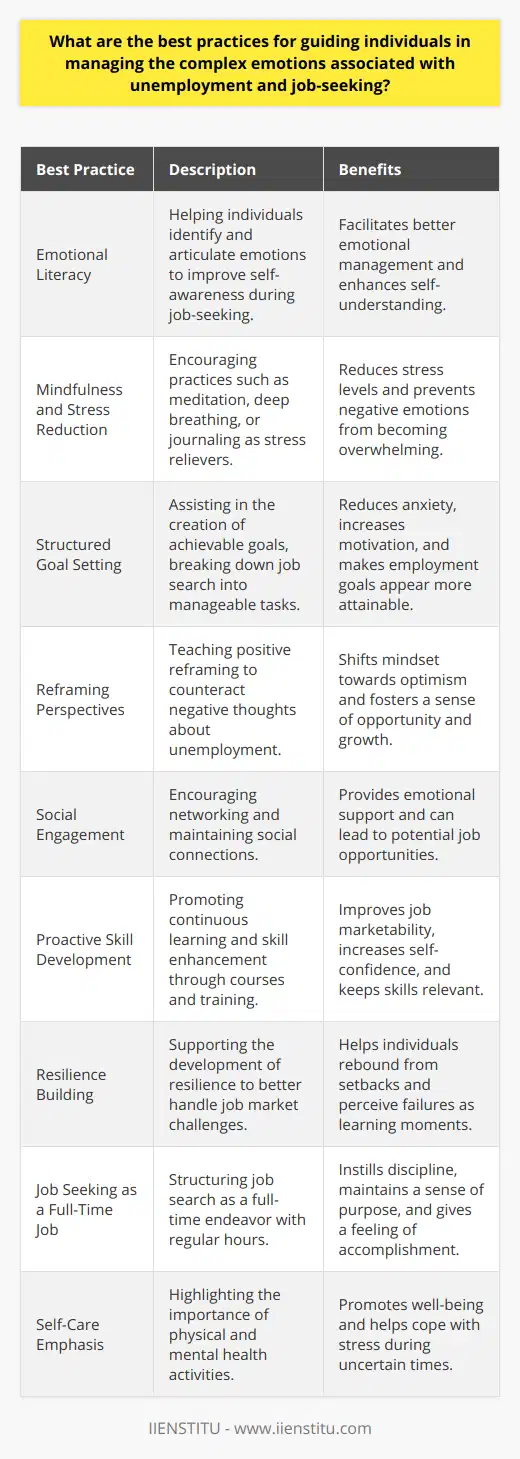
What psychological factors contribute to the current challenges faced by individuals seeking employment in rapidly evolving job markets?
Psychological Factors in Evolving Job Markets
Self-efficacy Beliefs
One psychological factor contributing to the challenges faced by job-seekers is their self-efficacy beliefs, or the confidence they have in their ability to perform job-related tasks. Individuals with low self-efficacy may perceive job searching as more difficult, leading to less motivation to pursue available opportunities.
Perceived Control
Perceived control over the job search process is another factor that may impede an individual's progress in securing employment. Job-seekers who feel they lack control may experience increased stress and decreased motivation, as they believe their efforts are futile or insignificant in determining their employment outcomes.
Adaptability
As job markets continue to shift rapidly, it is crucial for job-seekers to develop adaptability, or the ability to change and learn in response to new situations and challenges. Those who struggle with adaptability may find it harder to navigate the uncertainty and adapt to the changing nature of job markets.
Cognitive Flexibility
Cognitive flexibility, or the ability to switch between different concepts and tasks effectively, plays a crucial role in employment prospects. Job-seekers who lack cognitive flexibility may encounter difficulties adjusting to new job requirements, as they struggle to assimilate new information and adapt their problem-solving strategies.
Emotional Regulation
Job-seekers face various emotional challenges on their journey to both find and secure employment, and emotional regulation is key to effectively manage these emotions. Poor emotional regulation may contribute to feelings of stress, anxiety, and depression, thereby impeding the individual's job search success.
Social Support
The presence or absence of social support can significantly impact the psychological well-being of job-seekers. Support from friends and family can provide encouragement, guidance, and emotional relief during the job search process, while a lack of social support may contribute to feelings of isolation and hopelessness.
To conclude, psychological factors such as self-efficacy beliefs, perceived control, adaptability, cognitive flexibility, emotional regulation, and social support all play vital roles in determining an individual's success in navigating the challenges presented by rapidly evolving job markets. By recognizing and addressing these factors, job-seekers may improve their chances of achieving employment success.
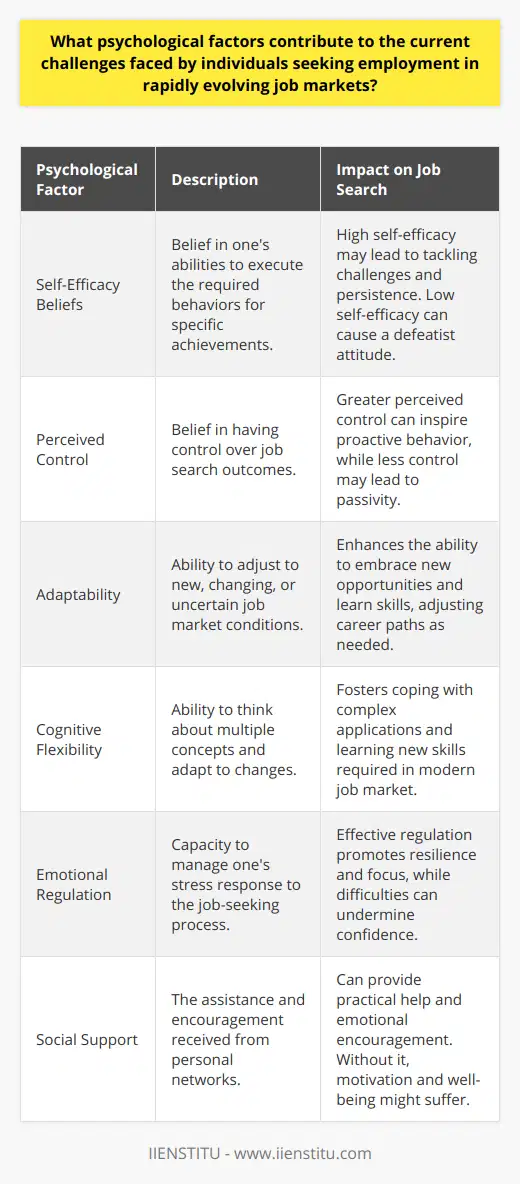
How can we identify and address systemic barriers and biases that exacerbate the difficulty of finding a job for marginalized populations?
Identifying Systemic Barriers
To address systemic barriers and biases that exacerbate the difficulty of finding a job for marginalized populations, we must first identify their specific features. These barriers can be found in various dimensions such as economic, social, and educational, impacting the lives of these populations negatively. Key areas to examine include human resource practices, accessibility to job networks, and availability of quality job opportunities.
Addressing Biased Human Resource Practices
Biased human resource practices within firms can perpetuate job disparities for marginalized populations. By promoting fair hiring practices and considering alternatives like blind recruitment, we can mitigate these barriers. Employers should also undergo regular diversity and inclusivity training to raise awareness of potential biases and minimize their impact on the hiring process.
Improving Access to Job Networks
Marginalized individuals often lack access to robust job networks, resulting in fewer opportunities. Encouraging employers to collaborate with community-based organizations is one way to provide better access to job resources for marginalized populations. Government initiatives, such as outreach programs, can also bridge the gap and connect potential employees with suitable employers.
Promoting Quality Job Opportunities
All too often, marginalized populations are limited to low-quality jobs with minimal growth potential. Advocacy for policies that ensure a living wage, job security, and equal opportunities for advancement is crucial. These policies should be adopted by both private and public sectors to create a more inclusive job market.
Skill Development and Education
Facilitating skill development and inclusive education is essential in overcoming systemic barriers. By providing tailored vocational training and adult education programs, we can enhance the employability of these populations. Partnerships with businesses and educational institutions can generate specialized curricula to serve the unique needs of marginalized communities.
Conclusion
In conclusion, identifying and addressing systemic barriers and biases in the job market for marginalized populations is critical. By focusing on equitable human resource practices, improving access to job networks, promoting quality job opportunities, and investing in skill development and education, we can work towards a more inclusive and diverse workforce.
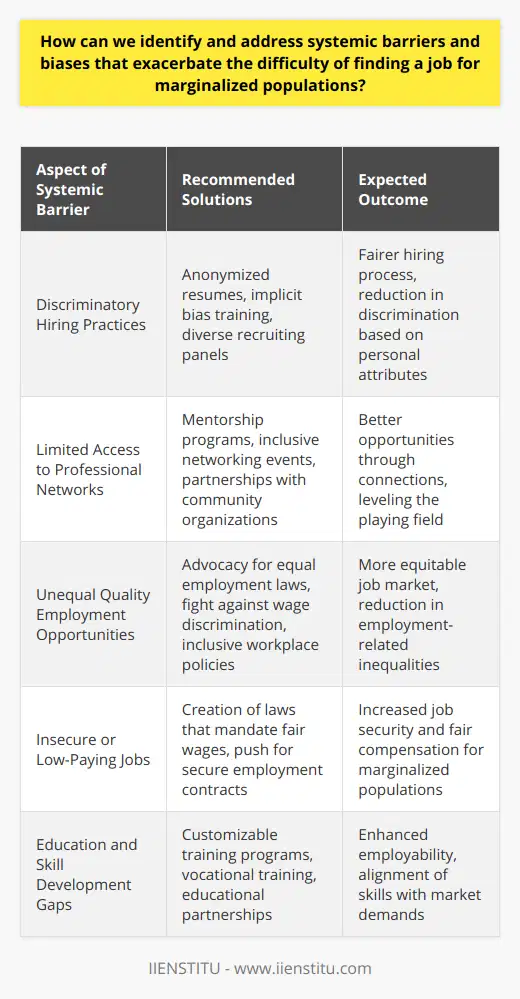
In times of economic uncertainty, what are the most effective interventions and resources to help people struggling to find suitable employment?
Intervention Strategies
During periods of economic uncertainty, targeted interventions and resources can significantly improve the prospects of individuals facing difficulties in securing appropriate employment. A combination of various approaches to address specific challenges in the labor market can lead to increased employment opportunities, enhanced job stability and potential for long-term economic growth.
Skills Development
One effective intervention focuses on enhancing the skills and abilities of job seekers. This may include training programs designed to impart valuable technical and vocational skills or further education to advance an individual's qualifications. By ensuring access to quality education and training, job seekers can better prepare themselves for available job opportunities, allowing them to compete more effectively in increasingly competitive labor markets.
Job Matching Services
Another crucial strategy involves the implementation of tailored job matching services. These platforms serve as a bridge between employers and job seekers, enabling both parties to find the best possible match for their needs, based on factors such as qualifications, experience and location, amongst others. Implementing these services as a key intervention strategy during times of economic uncertainty can foster the efficient allocation of human capital across various sectors and industries.
Networking Opportunities
In addition to the above-mentioned interventions, the provision of networking opportunities can further support individuals in their quest for suitable employment. Networking events, career fairs and mentorship programs can enable job seekers to build valuable contacts within their respective industries, increasing their chances of securing employment opportunities. These programs can also facilitate the sharing of essential knowledge and expertise amongst professionals.
Government Assistance
Lastly, it is paramount that governments play an active role in supporting their citizens during times of economic hardship. This can be achieved through various forms of financial assistance, such as unemployment benefits or tax incentives, which can support job seekers in covering their living expenses and maintaining economic stability until they secure suitable employment.
In conclusion, adopting a multifaceted approach through skills development, job matching services, networking opportunities and government assistance can significantly enhance the prospects of individuals struggling to find suitable employment in uncertain economic times. By leveraging a combination of these interventions and resources, we can strive towards a more inclusive and resilient labor market.

How can one effectively guide and empower an individual who is unable to find a job despite their qualifications and efforts?
Support Systems and Networking
To effectively guide and empower an individual who is unable to find a job despite their qualifications and efforts, one can begin by helping them assess the support systems available to them. By tapping into networks such as alumni associations, professional organizations, and social connections, job-seekers increase their chances of finding opportunities that match their skills and interests.
Skill Enhancement and Market Demand
Simultaneously, it is crucial to evaluate a person's skill set in relation to the current job market. If there is a mismatch between their qualifications and in-demand skills, it may be worthwhile to encourage the individual to pursue relevant training or education to bridge the gap. This will, in turn, make them a more attractive candidate to potential employers.
Customized Job Applications
It is also important to emphasize the value of tailoring job application materials to each prospective employer. This can include adjusting one's resume to highlight relevant skills and experiences, as well as crafting personalized cover letters that demonstrate genuine interest in the company and role. By doing so, job seekers can increase their chances of capturing a recruiter's attention and securing an interview.
Cultivating a Strong Online Presence
In today's digital age, maintaining a strong online presence is essential. Encourage the individual to polish their LinkedIn profile, as well as any other relevant professional networking profiles, to showcase their skills, accomplishments, and personal brand. Furthermore, utilizing social media platforms to engage with professionals and organizations in their desired industry can also help them identify potential job options and connections.
Positive Mindset and Persistence
Lastly, instill the importance of maintaining a positive mindset and perseverance throughout the job search process. Job hunting can be a challenging and time-consuming endeavor, but it is important to remain resilient and open to feedback. By providing emotional support and encouraging the individual to continuously hone their skills and network, they are more likely to eventually secure a suitable position.
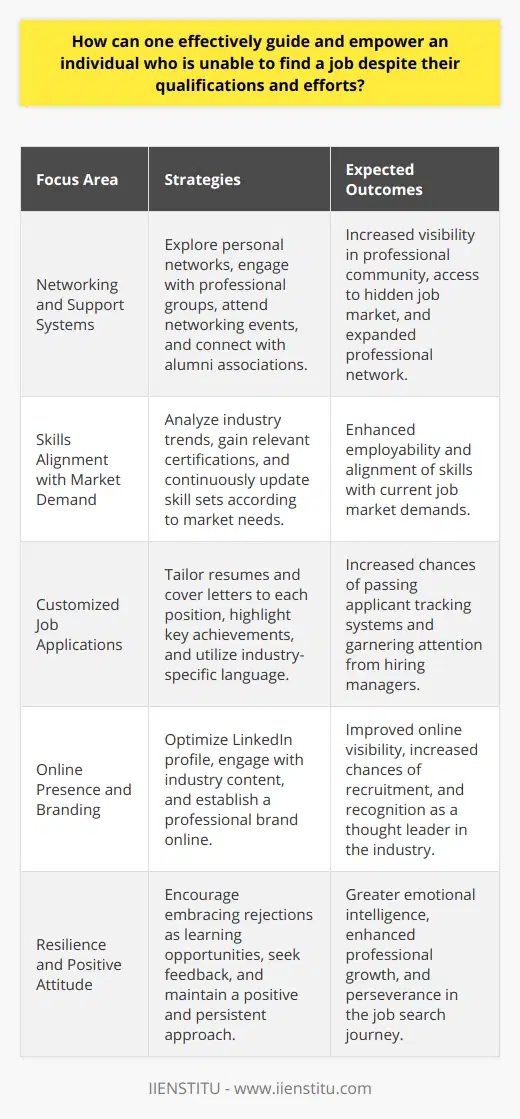
What are the most crucial factors to address when assisting someone in developing a comprehensive and strategic approach to their job search?
Key Factors in Job Search Strategy
Developing a Personal Brand
An essential component when assisting someone in developing a comprehensive job search strategy is establishing their personal brand. A strong personal brand highlights an individual's strengths, achievements, and unique attributes, making it easier for potential employers to identify them as a suitable candidate for a specific job.
Understanding the Job Market
Another crucial factor to address when assisting someone in their job search is understanding the job market for their chosen field or industry. This includes analyzing current market trends, identifying high-demand skills, and determining popular job titles and roles. Thorough knowledge of the job market enables job seekers to adapt their strategy and focus on relevant opportunities.
Networking and Building Connections
Building professional networks is integral to a successful job search. Encourage the individual to attend industry events, join relevant professional associations, and connect with professionals in their field on social media platforms, such as LinkedIn. Networking can lead to job leads, referrals, and valuable advice from experienced professionals.
Creating a Targeted Resume and Cover Letter
A well-crafted, targeted resume and cover letter are essential in a strategic job search. Ensure that the individual's resume highlights relevant skills, accomplishments, and qualifications aligned with the specific requirements of the job to which they are applying. A customized cover letter, tailored for each position, demonstrates genuine interest and initiative, significantly increasing the chances of receiving a positive response.
Utilizing Online Job Search Tools
Incorporating online job search tools and resources, such as job boards, company websites, and LinkedIn, is an essential aspect of an effective job search strategy. Encourage the individual to create accounts on multiple platforms and set up email alerts for new opportunities, streamlining their search process and ensuring they stay informed about new postings in their field.
Preparing for Interviews
Lastly, thorough interview preparation is a critical success factor in a strategic job search. Provide guidance on the most common interview questions, techniques for discussing accomplishments and qualifications, and tips for building rapport with potential employers. Equipping the individual with strong interview skills can significantly impact their ability to secure job offers.
In conclusion, a comprehensive job search strategy involves identifying personal branding, understanding the job market, networking, crafting targeted application materials, utilizing online job search tools, and interview preparation. Providing assistance in these areas ensures the individual has a well-rounded and effective approach to finding their ideal job.
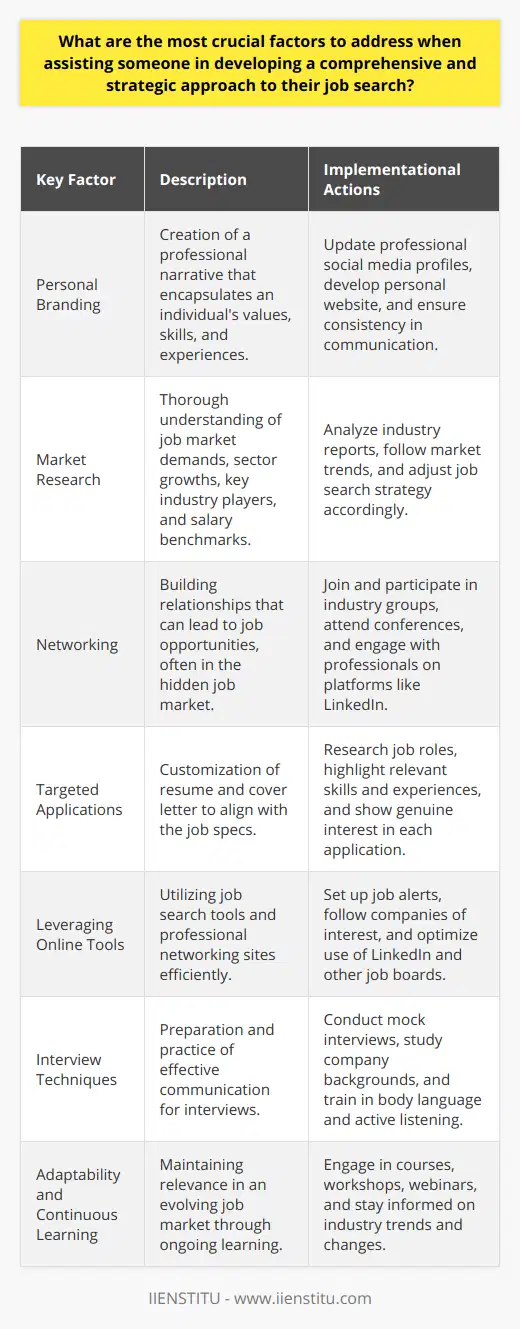
How can one facilitate the development of coping strategies and resilience in individuals experiencing frustration and disappointment in the face of repeated job rejections?
Developing Coping Mechanisms
To facilitate the development of coping strategies and resilience in individuals experiencing frustration and disappointment due to repeated job rejections, several interventions can be implemented. Firstly, support systems, such as friends, family, and professional services, play a crucial role in buffering the negative emotional impact. Encouraging individuals to actively seek and engage with these networks can provide much-needed comfort and guidance.
Enhancing Emotional Regulation Skills
Additionally, developing emotional regulation skills is essential for managing adverse reactions to setbacks. Techniques such as mindfulness, deep-breathing exercises, and progressive muscle relaxation can help individuals remain calm and focused during emotionally charged situations. By regularly practicing these techniques, individuals can become more aware of their emotional states and respond accordingly.
Reframing Thoughts and Perspectives
Cognitive restructuring or reframing is another effective coping strategy to adopt. This approach involves modifying maladaptive thoughts and beliefs that contribute to feelings of frustration and disappointment. Through cognitive restructuring, individuals can learn to identify and challenge unhelpful thought patterns and replace them with more adaptive, rational perspectives. This can lead to a healthier mindset and enhanced resilience.
Setting Realistic Expectations
Furthermore, setting realistic expectations and goals is necessary for building resilience. Understanding that job rejections are a common experience and that finding the ideal position may require time and persistence can help reduce disappointment levels. Encouraging individuals to break down long-term career objectives into smaller, manageable steps can provide a clearer sense of direction and accomplishment.
Developing New Skills and Engaging in Activities
Finally, engaging in activities unrelated to job searching can contribute to increased resilience. Developing new skills, volunteering, or participating in hobbies can not only provide a sense of achievement but also improve self-esteem and confidence. These activities can additionally serve as healthy distractions from the stress of repeated job rejections.
In conclusion, fostering coping strategies and resilience in individuals experiencing frustration and disappointment due to job rejections involves engaging with support systems, enhancing emotional regulation skills, cognitive restructuring, setting realistic expectations, and engaging in fulfilling activities. Implementing these interventions can significantly reduce the emotional burden experienced during the job search process and equip individuals with the resources to navigate challenging situations more effectively.
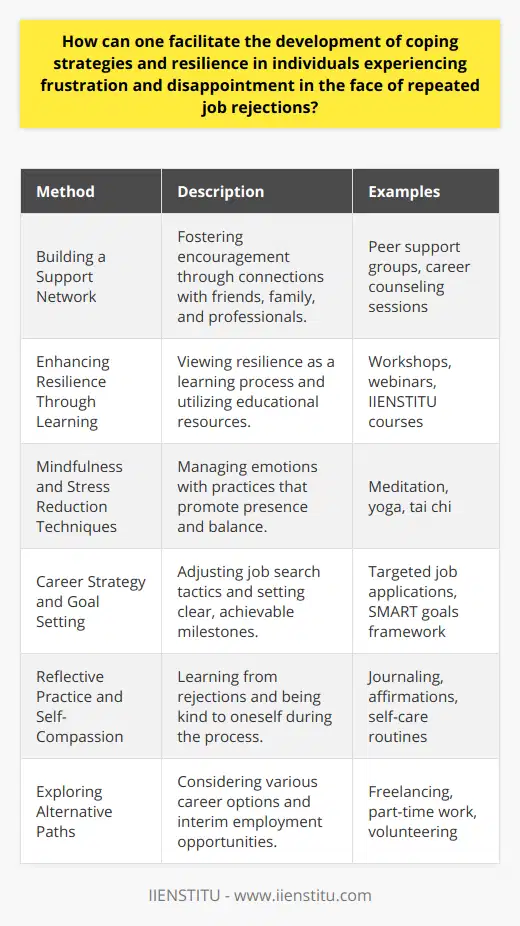
What are the primary reasons individuals might struggle to find employment in 2023, despite holding relevant qualifications or experience?
Technological Changes
One of the main reasons individuals might struggle to find employment in 2023 is the fast-paced technological change. Despite having relevant qualifications, they might lack the latest tech skills that jobs now require. Technological advancement has a broad impact on the job market, reshaping the nature of work, and making certain skills obsolete quickly.
Economic Instability
Economic instability could be another significant hurdle in securing employment. Fluctuations in the economy directly affect job prospects. A downturn typically results in job cuts and fewer openings, making the job market highly competitive, even for qualified individuals.
Skills Mismatch
A growing issue is a mismatch between the skills the job market demands and those an individual possesses. Even with relevant experience or qualifications, the individual's skill set may not align with the employer's needs. A 'skills gap' arises when employers cannot find employees with the skills required for their industry.
Changing Job Market Dynamics
Job market dynamics are continually changing. globalization and automation could lead to fewer jobs or shifts in job categories. A decrease in demand for certain job types or an increase in demand for jobs requiring different qualifications could leave many unable to find employment.
Increasing Competition
Lastly, increasing competition is another reason why finding a job can be challenging. There are more qualified individuals on the job market than there are job vacancies. This uneven ratio makes securing employment a competitive process, especially for positions with larger applicant pools.
In conclusion, technological change, economic instability, skills mismatch, changing job market dynamics, and rising competition can make it difficult for individuals to secure employment in 2023. Thus, continuous learning and adaptability are essential to stay relevant in the job market.
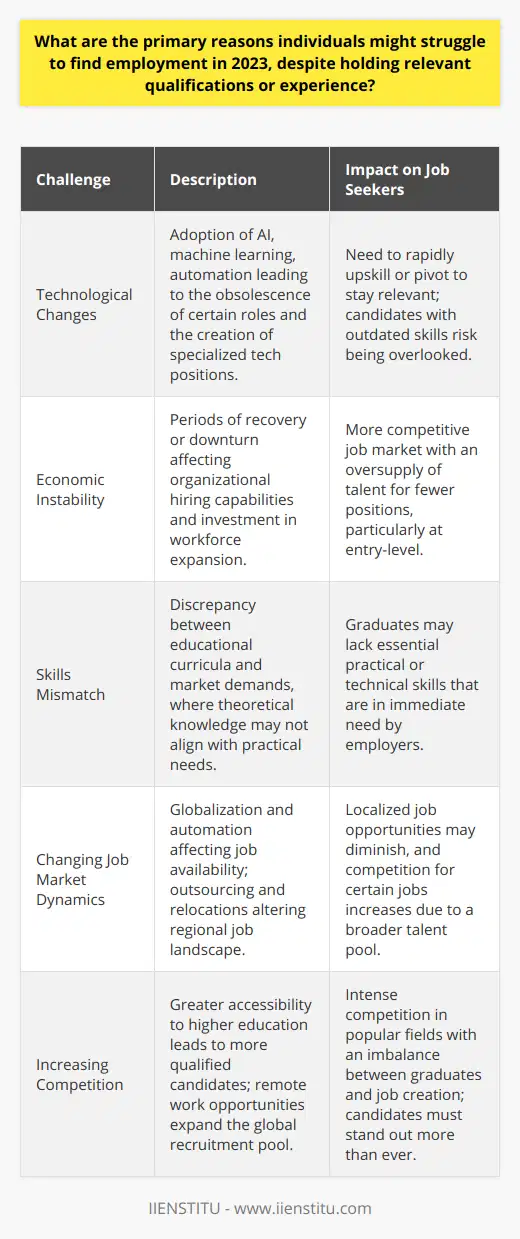
How can we best support individuals facing industry-specific job market challenges or disruptions as a result of technological advancements and automation?
Enhancing Skills Training
We can best support individuals facing job market disruptions through robust skills training programs. Upskilling and reskilling initiatives help workers stay relevant as technological advancements alter job landscapes.
Promoting Lifelong Learning
Promoting lifelong learning is also crucial. Individuals need to recognize that continuous learning and self-development are key elements in coping with market disruptions. To this end, educational institutions and employers should offer dynamic learning opportunities that reflect evolving industry needs.
Addressing Mental Health
Addressing mental health is equally important. Job market disruptions often lead to stress and anxiety. Therefore, providing mental health support, counseling, and wellness programs will ensure individuals maintain psychological health amidst job market fluctuations.
Increasing Access to Technology
Increasing access to technology is vital. In the digital age, individuals must have access to the latest technology to learn and adapt to new job trends. Public and private sectors should collaborate to reduce the digital divide and ensure equal access to technology for all.
Driving Policy Changes
Finally, driving policy changes needs our attention. Adaptive labor policies can protect individuals amidst the rapid pace of technological change. Governments can introduce and modify policies to support individuals facing industry-specific job market challenges.
To conclude, a comprehensive approach is necessary to support individuals against industry-specific job market challenges or disruptions caused by technological advancements and automation. This includes skill enhancement programs, lifelong learning, mental health support, equitable access to technology, and adaptive labor policies.
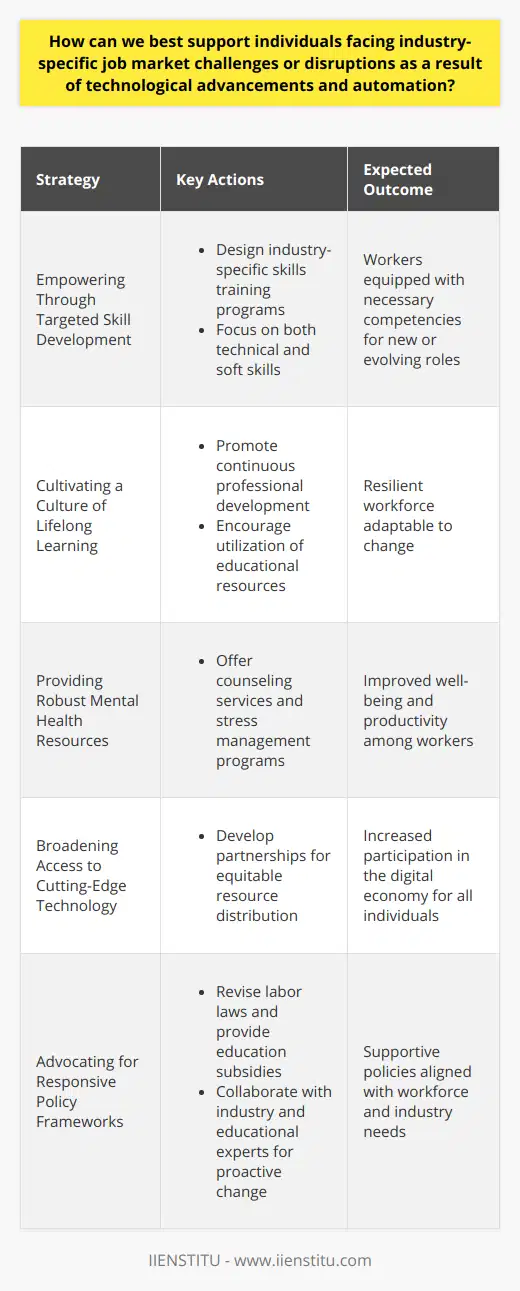
In the context of an increasingly globalized and competitive job market, what strategies can be employed to enhance an individual's job prospects and employability?
Acquiring Skills Relevant to Global Job Markets
In a competitive and globalized world, enhancing employability is crucial. One strategy is acquiring skills that are in demand globally. Those could be digital literacy, data analysis or foreign languages.
Strengthening Soft Skills
Soft skills also play an important role. Emotional intelligence, critical thinking and teamwork are transferrable skills desired in many fields. They help you adapt to diverse work environments.
Building a Professional Network
A professional network can also be a great advantage. Networking increases visibility in job markets and helps in career development.
Continuous Learning and Professional Development
Continuously learning and developing professionally can also enhance job prospects. Attend workshops, seminars or pursue online courses related to your field of work. This portrays a strong commitment to your career development.
Practical Experience
Practical experience makes you more employable. Internships provide this experience, help you gain industry insights and understand job expectations.
Online Presence
Finally, maintaining a professional online presence can improve employability. LinkedIn and digital portfolios showcase your skills, experiences, and achievements to potential employers.
Thus in an increasingly globalized and competitive job market, digital and soft skills, a strong professional network, continuous learning, practical experience, and a professional online presence are key strategies to enhance employability. They not only increase job prospects but also provide career stability and growth opportunities.
